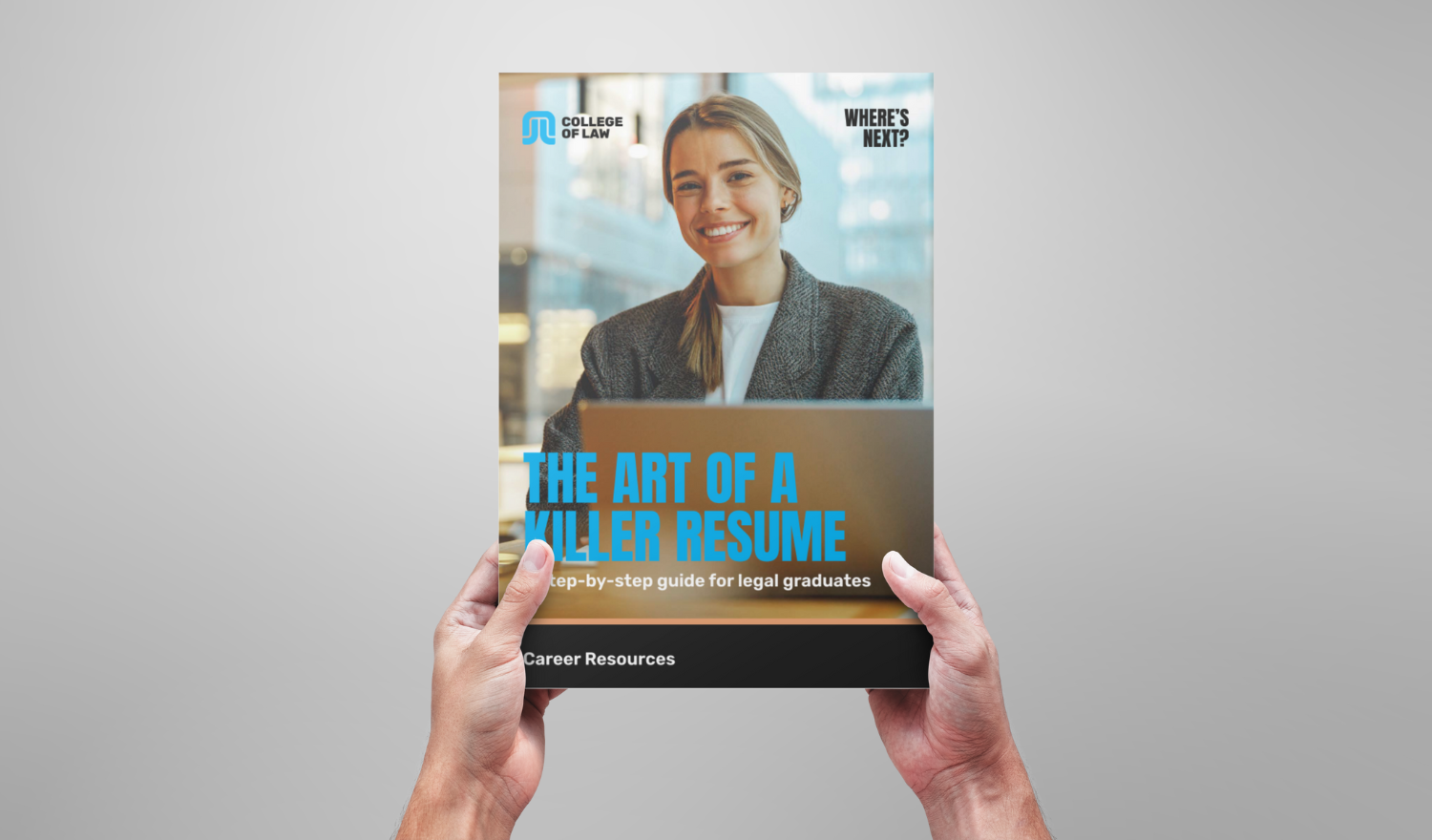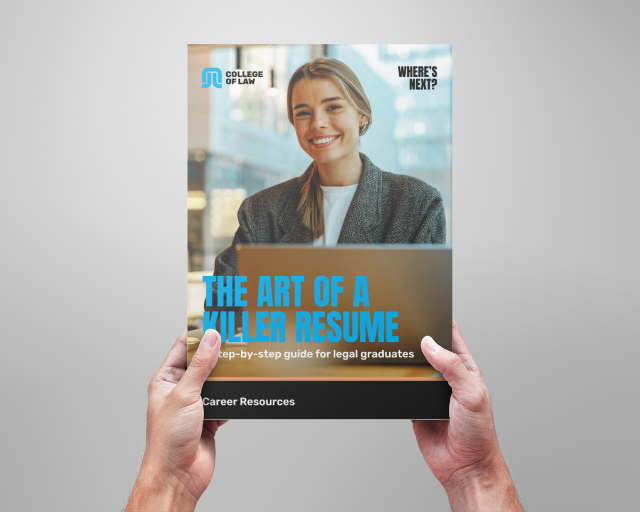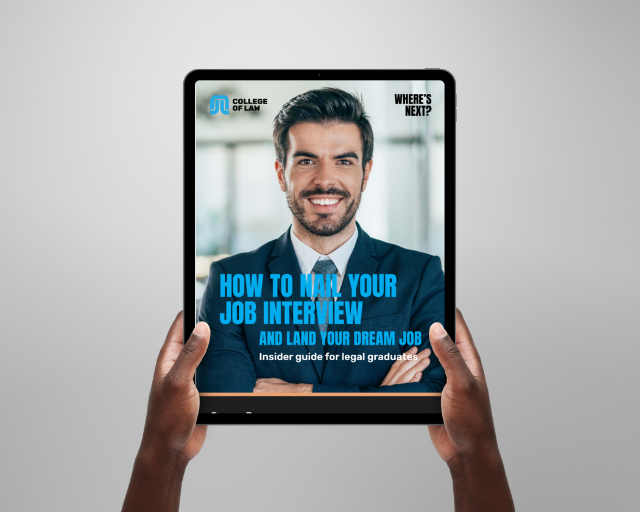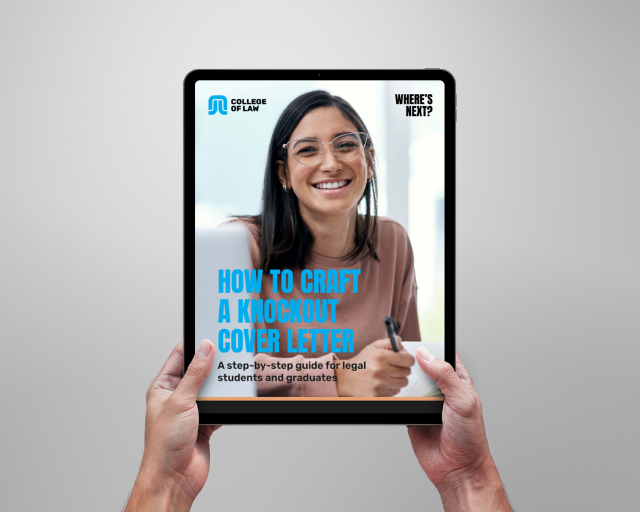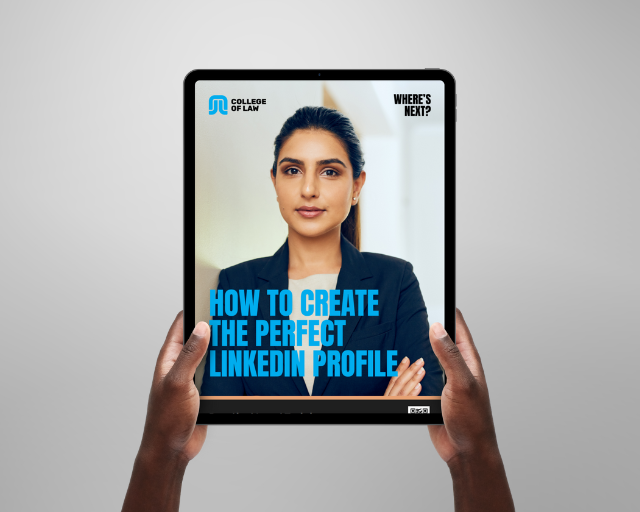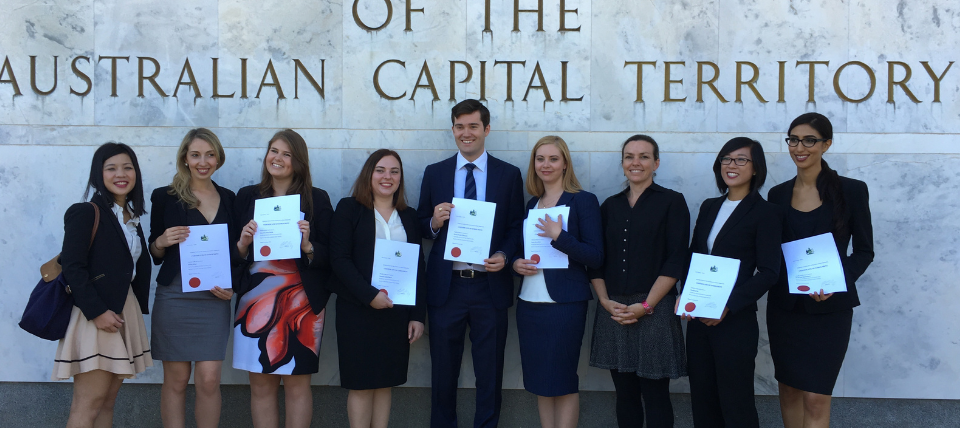So you’re ready to find that ideal graduate role to kickstart your legal career. Now is the time to focus on the most vital piece of the job-seeking puzzle: your resume.
It will come as no surprise to you that law is a highly competitive field. It’s a fact that has likely been mentioned by lecturers, peers and professionals you know already working in the legal sector.
And that means you will often be competing with countless applicants for those highly sought-after positions.
Your resume is your opportunity to showcase your worth – to highlight the most important benefits you offer a prospective employer. It’s the first point of contact a potential employer has with you. Don’t let it be the only point of contact they have with you.
The competition is tough, but by knowing what recruiters look for and pitching your skills and experience in their best light, you can make your resume stand out for all the right reasons.
1. The big picture
Before your fingers start dancing across your keyboard, slow your thought process down and take stock of the big picture. You want to ensure every section and word in your resume is intentional. This process starts with thinking about how you’re going to make sure your resume is opened, read with interest – and creates a positive and lasting impression.
Know your audience
First things first: who will be reading your resume? It’s likely to be one or a combination of these people:
- An in-house HR manager or recruitment manager
- An outsourced legal recruiter
- Firm partners or other senior lawyers
- Directors or managers
If you know your resume will be vetted by an in-house HR manager or recruiter, who doesn’t have a legal background, your word choice is crucial. They will be looking for key terms to make sure you have the right skill level for the position.
HR Managers will also want to assess whether you are a good fit for the organisation. By researching their culture and values, you’ll be able to highlight the relevant attributes that best align to the organisation.
Consider digital recruitment practices
If the above advice didn’t convince you to nail your key words, then this sobering fact should.
Resumes submitted via LinkedIn and SEEK or on some employers’ websites can be vetted by a machine before it makes it into the hands of a human being. That’s because some recruiters now use artificial intelligence (AI) in the first stages of their screening process.
So, go through that job ad with a fine-tooth comb and note the key skills and attributes the recruiter is looking for. And align your resume as close as possible.
Tailor your resume
The best way to get noticed as a candidate is to tailor your resume to the role you are applying for.
Customise your career overview, work history and skills to showcase your most relevant skills and accomplishments based on the keywords you highlighted.
A hiring manager should immediately be able to tell that you have relevant experience. If you have a long work history, this may mean you need to minimize or remove any positions that do not align.
A word of advice
Make sure your LinkedIn profile and resume are consistent. It’s a major red flag for employers if key dates, job history and skillsets across the two are out of sync.
2. Breaking it down
The information you’re putting forward is only as useful as the context it’s presented in. So, make sure you’re using the format that best suits your career stage.
Make your resume functional
For graduate job seekers, or those still studying and looking for work experience, the most appropriate format is a ‘functional resume’.
This format places most importance on your marketable skills and education achievements. It also emphasises any industry experience you may have.
Follow the below structure and tips when formatting your resume.
Your personal details
Provide your full name, best contact number, professional email address and LinkedIn profile URL.
Fortunately, the days of including your age, nationality, religion and marital status are long gone. You also don’t need to provide your full address (a suburb, state and postcode will suffice).
Remember to stay clear of email addresses that feature a high school nickname, or anything else inappropriate. The email server you use also says a lot about you. Hotmail is dated and indicates lack of digital literacy. And a university email doesn’t position you as a professional.
If the above applies to you, it is worth setting up a new, more work-relevant account. A good format to follow is your first and last name, i.e. firstname.lastname@gmail.com
A word on photos in your resume: Save your photos for your LinkedIn profile. Law can be a traditional profession.
Career overview
A career overview can be useful for those with extensive professional experience. It should be tailored to each and every role you apply for.
Professional career history
Recent relevant experience is the name of the game here.
While all employment is important, work in the legal profession should have its own section and come higher up in your resume. Each entry should feature the organisation’s name and location, your job title and dates of employment.
Then provide a list of 3-4 bullet points on your key responsibilities and contributions. Use first person, active language and strong action verbs, such as developed, initiated or facilitated. And provide specific metrics where possible. Also include examples of your achievements to demonstrate your value.
See the following section on How to promote your skills for detailed examples.
Education and Practical Legal Training (PLT)
If you’ve completed your PLT and have your Graduate Diploma of Legal Practice, make sure you list this at the top of your education history. This tells your potential employer that you are ready to work immediately. Also include your expected admission date if known.
Following this, list your tertiary qualifications including dates and the name of the institution.
You may wish to list your majors, outstanding grades and GPA where relevant to the role.
Professional association memberships
Demonstrate practical examples of interest in the field and job readiness by listing any memberships you have to relevant professional associations.
It’s highly recommended that all students join the young lawyer’s section of their state law society.
The student discount for membership makes it a particularly appealing to join.
If you have a clear idea of the field you want to practise in, take time to research the relevant associations and invest in a membership. For example, there is a Family Law Practitioners Association of WA – which is ideally suited to those pursuing a career in family law.
The Women’s Lawyers Association is also a worthwhile professional body for women looking to network and build professional relationships.
Volunteer work and interests
Volunteer work is also highly regarded by employers. It demonstrates that you’re socially aware and passionate about championing the greater good. It also gives you the opportunity to promote any job-relevant skills you’ve acquired during your community work.
And don’t forget to show that you’re human by including your interests. Showcasing the activities you’re passionate about reveals that you are an interesting and well-rounded person. But don’t just give a shopping list – put some thought into how you word this section.
And give examples of how your passions come to life. Maybe you’re a foodie and have your own breakfast review Instagram following. Or maybe you can’t get enough of native birds and go hiking every weekend with your local bird watching group.
Other work history
Use this section to highlight any transferable skills you’ve acquired during paid work.
While you may not think your five years in retail or hospitality is highly relevant to a legal role, it’s still worth including in your resume because it shows commitment and professionalism.
Keep this section brief and don’t go into extensive details on your tasks and responsibilities. Highlight any relevant achievements – such as highest sales for the month of February, or a new initiative you introduced.
The following section, How to promote your skills, will take you through how to position your employment history in the best and most relevant light.
Referees
Sure, your Aunty Jan would give you the thumbs up, but she’s not a credible professional referee.
Instead, find 2-3 people you have worked with in a professional environment (work related or academic) with no personal connection to you. Lecturers and managers are a good first port of call, as are former supervisors from legal internships as well as your non-legal work experience.
List their name, organisation, job title and contact details. Before you include them, ask their permission and let them know if you reach the interview stage on any job you apply for.
3. Making your skills shine
You need to convince the reader that you’re the right fit for their role by drawing on your relevant work experience and transferable skills. And you need to promote your skillset with punch and authority.
Talking about your skillset
It’s not enough to write ‘Well-developed writing skills’. You need to briefly back up this claim and give it meaning. Each statement should be reinforced by a one - two sentence explanation of how you developed that skill.
For example: Well-developed writing skills (statement) developed through volunteering at the Community Legal Centre (explanation). The role involved undertaking preparatory writing for interviews, and I received high praise on the quality of my work (example).
Highlight your achievements
Whilst sometimes it is an achievement to meet a goal, particularly in difficult circumstances beyond your control, it is also important to highlight where you have exceeded a target or had an exceptional outcome. Wherever possible, include metrics to back your achievements up and show the impact and result of what you did.
Draw out your transferable skills
An employer understands that legal skills such as legal research, drafting and advocacy are refined and developed over time. If you’re applying for an entry-level or graduate role, the hirer won’t be expecting you to illustrate all the key competencies from legal experience alone.
It’s perfectly okay to highlight the relevant skills you’ve developed through your PLT, non-legal work, university studies and unpaid or voluntary work.
For example, you can also draw on your PLT work placement and highlight skills, such as real client presentations and drafting letters of advice. You will also be able to promote the experience you gained during this process, such as understanding how to appear in court and file an interlocutory application.
10 SKILLS TO INCLUDE ON A LEGAL RESUME (WITH EXAMPLES)
Download the full step-by-step guide to writing a killer legal resume.
4. Presentation and polishing
They say the devil is in the detail. This statement rings especially true for your resume.
Carelessness can undermine all the hard work you’ve put in, so give yourself plenty of time for proofreading and finessing the layout.
Select an appropriate font
Use easy-to-read text in a modern font such as Arial or Calibri. Size 11 or 12 font are ideal.
Present it professionally
Make sure your resume is easy to navigate and inviting to read, with defined sections and ample white space. Apply clear headings and bulleted lists – and ensure everything is aligned. Make sure dates are easy to read, with month and year if possible.
Be succinct, make every word count
When it comes to length, less is more. Two-page resumes are ideal. If that’s not possible, aim for no more than three pages. Most importantly, follow the employer’s instructions if they give set guidelines on length.
Proofread, proofread, proofread
Proofreading is one of the most important stages in creating your resume. A typo or misplaced apostrophe may be all it takes for the reader to decide you don’t have the attention-to-detail needed for their role.
It’s easy to overlook mistakes in your own writing. If possible, get a friend or family member to proofread your resume. Fresh eyes are much more likely to pick up grammar errors and spelling mistakes.
LAW GRADUATE SAMPLE RESUME
Download the full step-by-step guide to writing a killer legal resume.
